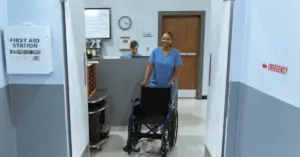Navigating the dynamic world of travel nursing often feels like treading uncharted waters.
Each new hospital or city presents its set of challenges, and there’s no better compass than the collective wisdom of your peers.
Peer learning is not just a strategy; it’s a bridge to collaborative growth, especially for Black travel nurses. Here’s why.
The Essence of Peer Learning in Travel Nursing
Imagine landing in a new city, stepping into a hospital with distinct protocols, and being surrounded by unfamiliar faces. Here, your colleagues—those who’ve been there and done that—become your greatest asset. They offer guidance, share their experiences, and introduce you to the unspoken rules of the new environment.
Cultivating a Sense of Belonging
As a Black travel nurse, you might sometimes find yourself in the minority, navigating microaggressions or subtle biases. In these moments, connecting with fellow Black nurses offers solace. Sharing experiences, offering advice, or simply lending an understanding ear fosters a sense of belonging.
Nurturing Professional Growth
There’s a wealth of knowledge in the stories, successes, and even failures of your peers. Discussing challenging cases, sharing resources, or brainstorming innovative patient care strategies nurtures your professional growth. It’s in these peer sessions that learning goes beyond textbooks.
Building Confidence and Competence
When you witness peers tackling challenges, it not only equips you with solutions but also instills confidence. Observing or collaborating on best practices, especially in unfamiliar settings, enhances your competence and prepares you for diverse nursing scenarios.
Enhancing Cultural Competence
Travel nursing introduces you to a mosaic of cultures. Engaging in peer discussions, especially with fellow Black nurses, can offer insights into culturally sensitive care, ensuring that patients receive care that respects their cultural and individual nuances.
Opportunities for Mentorship
Within the community of Black travel nurses, there’s a rich tapestry of experiences. Senior nurses can mentor newcomers, offering a blend of professional advice and personal stories that resonate with shared experiences.
The Power of Collaboration in Problem-Solving
Two heads, they say, are better than one. When faced with a nursing challenge, tapping into the collective intelligence of peers often yields diverse solutions. This collaboration not only addresses immediate concerns but also broadens your perspective on patient care.
Elevating Advocacy and Representation
Peer learning extends beyond clinical knowledge. Engaging with Black nurse peers can catalyze discussions on advocacy, representation, and leadership in healthcare. Together, you can champion causes, influence policies, and elevate the voice of Black nurses in the larger nursing narrative.
Offering and Receiving Emotional Support
The emotional demands of travel nursing, compounded by racial dynamics, can sometimes be overwhelming. In peer groups, especially those comprising Black nurses, there’s emotional validation. It’s a safe space for you to express, reflect, and recharge.
Harnessing Digital Platforms for Peer Learning
Today, you don’t need to be in the same room to engage in peer learning. Online forums, webinars, and social media groups offer virtual platforms where Black travel nurses from around the globe connect, share, and grow collaboratively.
Travel nursing is a journey, one where every step can be enriched through the collective wisdom of peers.
By embracing collaborative growth, you’re not just enhancing your professional trajectory; you’re also reinforcing the threads that bind the community of Black travel nurses.
FAQs
1. How can I initiate peer learning sessions in my new workplace?
Start with informal coffee breaks or lunch sessions. Express your interest in learning and share your own experiences. Over time, these sessions can evolve into regular meet-ups or discussion forums.
2. Are there online platforms tailored for Black travel nurses for peer learning?
Yes, numerous forums, Facebook groups, and organizations offer platforms for Black travel nurses to connect and learn. Examples include the National Black Nurses Association (NBNA) forums and Black Nurses Rock online communities.
3. How can I ensure that peer learning remains constructive and doesn’t devolve into mere gossip sessions?
Set clear objectives for each session. Whether it’s discussing specific cases, sharing resources, or addressing challenges, having an agenda ensures the conversation remains productive.
4. How do I navigate disagreements during peer learning sessions?
Approach disagreements with an open mind. Everyone brings unique experiences, and the aim is to learn, not to win. Respectful dialogue, active listening, and seeking common ground can navigate disagreements constructively.
5. Can peer learning contribute to Continuing Education Units (CEUs)?
While informal peer learning sessions may not count, organized workshops, seminars, or presentations facilitated by peers often qualify for CEUs. Always check with your nursing board or association for specific guidelines.





